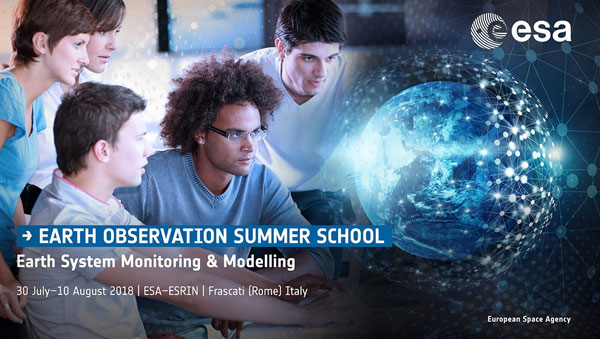BACKGROUND AND OBJECTIVES
European Space Agency (ESA) organises a series of summer schools on Monitoring of the Earth System to promote the exploitation of Earth Observation EO data across disciplines, with a specific focus on their assimilation into Earth System models.
The two-week course, held in ESA/ESRIN (near Rome, Italy) from 30 July to 10 August 2018, aims to provide students with an integrated end-to-end perspective going from measurement techniques to end-user applications. Courses include lectures covering issues related to Remote Sensing, Earth System Modelling and Data Assimilation as well as hands-on computing exercises on the processing of EO data. Keynote lectures on global change issues are also given to discuss the current state of the science of global change and its relationship to society in order to help students appreciate how their specific field fits into a broader scientific and political context. For more information, please see previous programme, news or video.
The school is open to Early Career Scientists (i.e. Ph.D. students, young post-doctoral scientists) who are specialised in a variety of Earth Science disciplines and wish to expand and improve their knowledge and skills. Participation is limited to a maximum of 60 students and is highly competitive. There is no fee for the school but students are expected to cover their own travel and accommodation cost (unfortunately, financial support is not available).
All enquiries should be addressed to eotraining@esa.int
TOPICS
Global Observing Systems: Capabilities and applications of Earth Observation, physics of remote sensing measurement, concept of integrated Observing Systems of Systems.
Earth System Modelling: Basics of ocean, atmosphere, land and ice modelling, Numerical Weather Prediction, ensemble forecasting.
Data Assimilation: Theory of data assimilation techniques (e.g. optimal interpolation, variational methods, Kalman filter, ensemble filtering) and applications (e.g. re-analysis, inverse modelling, state estimation, control theory, design of optimal observing system, targeting observations).
Global Change: Observation of global change from space, use of Earth System model to understand, forecast and manage environmental issues.
This will be a live streamed event
